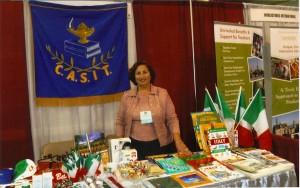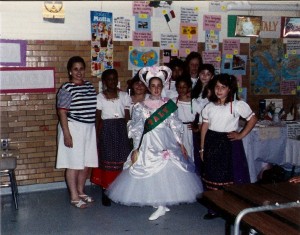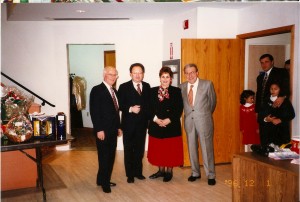 “When we lived in Melrose in the mid 1970s, my eldest daughter used to bring pizza to school for lunch. For her, having grown up in an Italian household, it was the most normal thing in the world. At some point however she started to come home and say they were making fun of her, therefore she didn’t want pizza anymore. Yes, discrimination was that strong! That is when I went to the principal and I said I want to start an afternoon enrichment program — in Italian. After a couple of years, we had 30 children and families were lining up to join in. By the time my younger daughter went to school, pizza was in style!”
“When we lived in Melrose in the mid 1970s, my eldest daughter used to bring pizza to school for lunch. For her, having grown up in an Italian household, it was the most normal thing in the world. At some point however she started to come home and say they were making fun of her, therefore she didn’t want pizza anymore. Yes, discrimination was that strong! That is when I went to the principal and I said I want to start an afternoon enrichment program — in Italian. After a couple of years, we had 30 children and families were lining up to join in. By the time my younger daughter went to school, pizza was in style!”
That is how, in her own words, pronounced with a strong accent of pride, Gioconda Motta began her lifelong effort to promote and foster Italian language in the Boston area. Her continuous and relentless action involving both private initiatives and public institutions have made her name synonymous with Italian instruction throughout, not only in the city, but throughout the state. And that wasn’t even her main occupation!
“I was brought up to be a teacher, even through the toys my parents bought me,” the recently retired special and regular education teacher and administrator recalls. The youngest of eight children from the small town of Palermiti in the mountains of Calabria, Motta was sent to Catholic School in Catanzaro before joining the rest of her family to America. “If you learn something and you do not pass it along it is useless,” she remembers being one the nuns’ mantras.
And Gioconda did, indeed, pass along her knowledge, but she had some acquiring to do first: command of the English language, to start with, which she had to learn basically from scratch, plus the tools of the teaching trade, learned while pursuing her bachelor’s and master’s degrees at UMass and Leslie College respectively. After what she calls “five long years” of working for an insurance company, she finally started to fulfill her destiny: launching a teaching career that according to her was “written in the stars.”
 Yet, her full-time jobs as a regular and special education teacher and then administrator opened doors for her spare-time occupation as an organizer of course in Italian culture in Melrose, Lynnfield, Hull and Medford, as well as a 30-year program at Dante Alighieri.
Yet, her full-time jobs as a regular and special education teacher and then administrator opened doors for her spare-time occupation as an organizer of course in Italian culture in Melrose, Lynnfield, Hull and Medford, as well as a 30-year program at Dante Alighieri.
These parallel tracks of action, feeding off each other for years in a sort of “tricolor synergy,” landed Motta at the head of Centro Attività Scolastiche Italiane (C.A.S.IT), the local agency of a worldwide network set up by the Italian government in the late 1990s, in a push to promote the Italian language in public schools. The program, initially heavily funded by the Italian government, aimed at introducing the teaching of Italian to public school districts. The idea was to get schools and families used to the programs and enthusiastic enough to the point of first matching the funds and later progressively taking the entire burden on their shoulders.
Despite an extremely promising start in the early 2000s, growth was slowed by lack of state, national and international funding precipitated by the economic crises on both sides of the Atlantic. Nevertheless, the number of students (about 10,000) and courses (60) around the state managed to remained stable, thanks to the different models of cooperation devised by the consulate, the schools, Gioconda and her collaborators.
 The recent consulate-sponsored fundraising events certainly help, but keeping the interest high seems like a constant challenge. “I believe that Italian language and culture are blooming,” Motta notes. “Paradoxically, however, places that are more Anglo-Saxon want the programs more than the Italian-American communities.”
The recent consulate-sponsored fundraising events certainly help, but keeping the interest high seems like a constant challenge. “I believe that Italian language and culture are blooming,” Motta notes. “Paradoxically, however, places that are more Anglo-Saxon want the programs more than the Italian-American communities.”
Certainly, Gioconda’s drive and enthusiasm are anything but dwindling. Her house — already flooed with mementos from the old country — is further inundated with materials for her latest project: a two-week full-immersion Italian language and culture summer camp for kids aged 4 to 9 at the Eliot Innovation School in the North End of Boston.
So now, after a 40-year career full of achievements and awards, instead of enjoying retirement, Gioconda is involved more than ever in juggling crayons, books and permission slips. Maybe that’s exactly her idea of enjoying retirement: “The camp is a new adventure, it’s exciting,” she shares. “if it weren’t exciting, I wouldn’t be doing it.”
Odds are that it will be another resounding success, and chances are equally good that pizza will be served at lunch break.
